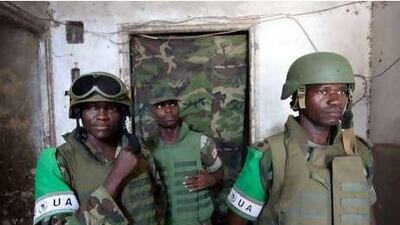NAIROBI // With fears raised after last month's attack in which 76 people died in Kampala while watching the football World Cup, a further 4,000 African Union (AU) soldiers have been pledged to Somalia to help suppress an Islamic insurgency that has threatened to destabilise all of East Africa.
The new troops, some of them from Guinea and Djibouti, will join 6,000 besieged Ugandan and Burundian peacekeepers in Mogadishu, the capital. The two-and-a-half-year-old AU force, which is known as Amisom, has been largely unsuccessful at keeping peace in Somalia, where two decades of war has created a chaotic and lawless failed state. The pledge of more troops at an AU summit in the capital Kampala last week was met with defiance by al Shabab, the militant group linked to al Qa'eda that has been fighting to impose a harsh form of Sharia in Somalia.
"The extra troops they said they are planning to send here will not be different from those they deployed before," Sheikh Ali Mohammed Rage, al Shabab's spokesman, told reporters in Mogadishu. "By the will of Allah, Mogadishu will be their graveyard, while their families will cry back home." Uganda will also add more troops to bolster the Amisom force and the soldiers will be able to carry-out pre-emptive attacks against the militants. It backed off plans for a full-scale offensive after al Shabab launched the bomb attack in Kampala. The attack, al Shabab's first outside of Somalia, showed that it can successfully carry out threats to destabilise the region.
Amisom believes the additional troops will help stabilise the country and provide an opportunity for a peace process. "The troops will work as a catalyst to create an environment for dialogue to take place for all those who are interested in peace in Somalia, and for those who are interested in dialogue in Somalia to go back to their residences, or wherever they come from, without fear," said Major Barigye Ba-Huko, an Amisom spokesman.
Somalia has been a hostile place for foreign forces over the past 20 years. US Marines were run out of Mogadishu in the early 1990s followed, in turn, by a huge UN peacekeeping force. In 2008, the Ethiopian troops that ousted Somalia's Islamic government pulled out after two years of heavy fighting. The AU mission has fared little better. Constantly under attack and hunkered in a few urban outposts, the force has been little more than bodyguards for the weak transitional government that controls a few city blocks of Mogadishu. Al Shabab rules much of the nation on the Horn of Africa.
Analysts have said more troops alone would not solve the problem in Somalia. The international community should assist the Transitional Federal Government (TFG) and continue to train Somali forces to take defend their own country, said Rashid Abdi, a Somali expert with the International Crisis Group. "A modest troop surge to shore up government positions and prevent the government from being overrun is a good thing," he said. "Then what is needed is a parallel process to train the TFG to fight its own fight and allow Amisom to pull out."
Mr Abdi questioned the decision to send troops from Guinea and Djibouti. Guinean soldiers have a questionable human-rights record, he said, adding that Djibouti, a neighbouring country of ethnic Somalis, has too much of a vested interest in Somalia. Amisom has already come under criticism for the large number of civilian casualties as a result of fighting between the peacekeepers and militants, who often launch attacks from crowded markets or residential areas.
The US, which helps fund and train AU troops and those of the Somali government, is backing the increase, but is concerned about the growing number of civilian casualties, Johnnie Carson, the top US diplomat for Africa, told reporters. "There is absolutely no question that Amisom recognises the dangers inherent in firing into civilian areas," he said. "It not only creates casualties, but it turns the population against them. This is, again, not a matter of policy, not a matter of intent, and Amisom is doing everything that it possibly can to reduce civilian casualties and to be careful in the way that it operates on the ground."
@Email:mbrown@thenational.ae

